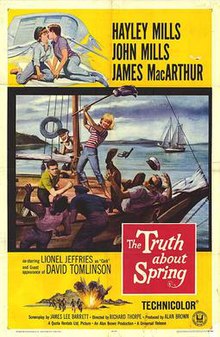The Truth About Spring
| The Truth About Spring | |
|---|---|
 Theatrical poster | |
| Directed by | Richard Thorpe |
| Written by | James Lee Barrett |
| Based on | Satan: A Romance of the Bahamas (1921) by Henry De Vere Stacpoole |
| Produced by | |
| Starring | |
| Cinematography | Edward Scaife |
| Edited by | Thomas Stanford |
| Music by | Robert Farnon |
Production company | Quota Rentals |
| Distributed by |
|
Release date | 31 March 1965 |
Running time | 102 minutes |
| Countries |
|
| Language | English |
| Box office | $1,500,000[1] |
The Truth about Spring (also known as The Pirates of Spring Cove or Miss Jude)[2] is a 1965 American-British Technicolor adventure film directed by Richard Thorpe and starring Hayley Mills, John Mills and James MacArthur.[3] It is a romantic comedy adventure. It was released by Universal.[4]
Plot[]
Spring lives with her father aboard a run-down sail boat in the Florida Keys. She has lived a simple, carefree, and isolated life. She has never felt desire or love until Ashton joins them for a zany adventure involving buried treasure. In the end no treasure is found, only a long-sunken slaver. However, Spring finds love and a future husband.
Ashton, who is from a wealthy Philadelphia family and graduated from Harvard Law School, comes aboard the Sarah Tyler for some fishing. Instead, he becomes involved in a modern-day pirate adventure. He falls in love with Spring and envies her simple and honest lifestyle. Spring initially dislikes Ashton – a variation of Pride and Prejudice where boy meets girl and girl hates boy. At the end of the film, she realizes she loves him, and, against all sense of propriety, Ashton asks Spring to become his wife.
Cast[]
- Hayley Mills as Spring Tyler
- John Mills as Captain Tyler
- James MacArthur as William Ashton
- David Tomlinson as Ashton's bored, rich uncle.
- Lionel Jeffries as José Carkez
- Harry Andrews as Judd Sellers
- Niall MacGinnis as Cleary
- Lionel Murton as Simmons
Production[]
The film was based on the 1921 novel Satan by Henry de Vere Stacpoole.[5] The book was filmed in 1925 as Satan's Sister.
The film was announced in September 1963 as Miss Jude with both Mills attached from the beginning.[6] Producer Alan Brown had been associate producer to Samuel Bronston and this would be his first film as production.[7] It was the third movie John and Hayley Mills had made together after Tiger Bay and The Chalk Garden. John Mills said he wanted to use the title Close to the Wind but it was held by another studio.[8]
Location shooting took place in S'Agaró on the Costa Brava in southern Spain and started 22 April 1964.[9] The MGM-British Studios at Elstree were also used for some shooting. The film's sets were designed by the art director Gil Parrondo.
David Tomlinson later called it "a truly dreadful film but with my new-found Hollywood cachet I was billed as making a 'Guest Appearance' in nice big capital letters".[10]
John Mills later wrote "if the picture had turned out to be half as good as the food, the wine, the time and the laughs we had on that location it would have been a sensation - unfortunately it wasn't."[11]
Further reading[]
- De Vere Stacpoole, Henry (1921). Satan: A Romance of the Bahamas. New York: Robert M. McBride and Company. Reprinted 2013 by Duff Press ISBN 978-1473302211
See also[]
- Satan's Sister (1925), based on the same book
- The Cruise of the Make-Believes (1918), which has a similar theme
References[]
- ^ Anticipated rentals accruing distributors in North America. See "Top Grossers of 1965", Variety, 5 January 1966 p 36
- ^ "The Pirates of Spring Cove". Sky movies. Retrieved 3 December 2015.
- ^ Howard Thompson (17 June 1965). "NY Times review". New York Times. Retrieved 15 November 2008.
- ^ TRUTH ABOUT SPRING, The Monthly Film Bulletin; London Vol. 32, Iss. 372, (Jan 1, 1965): 96.
- ^ Stacpoole's "Satan" New York Times 8 May 1921: 49
- ^ Looking at Hollywood: 'Miss Jude' Will Star Hayley and Her Dad Hopper, Hedda. Chicago Tribune 30 Sep 1963: b7.
- ^ Stage 'Albatross to Be MGM Comedy: Actor Pledges Clean Films; Hayley's Father Finally Is Scheuer, Philip K. Los Angeles Times 6 July 1964: C19.
- ^ BY WAY OF REPORT By A.H. WEILER. New York Times 8 Mar 1964: X9.
- ^ Surprise Nazi Ruse Told in '36 Hours': 'Ship's' Company First Class; MacArthur Son With Hayley Scheuer, Philip K. Los Angeles Times 21 Apr 1964: C9
- ^ Tomlinson, David (1990). Luckier than most : an autobiography. Hodder and Stoughton. p. 151.
- ^ Mills, John (1981). Up in the clouds, gentlemen please. Penguin. p. 368.
External links[]
- English-language films
- 1965 films
- American films
- British films
- British coming-of-age films
- Films directed by Richard Thorpe
- Universal Pictures films
- Seafaring films
- Treasure hunt films
- British comedy films
- American comedy films
- 1960s adventure comedy films
- British adventure films
- American adventure films
- 1960s adventure films
- Films based on British novels
- Films shot at Elstree Studios